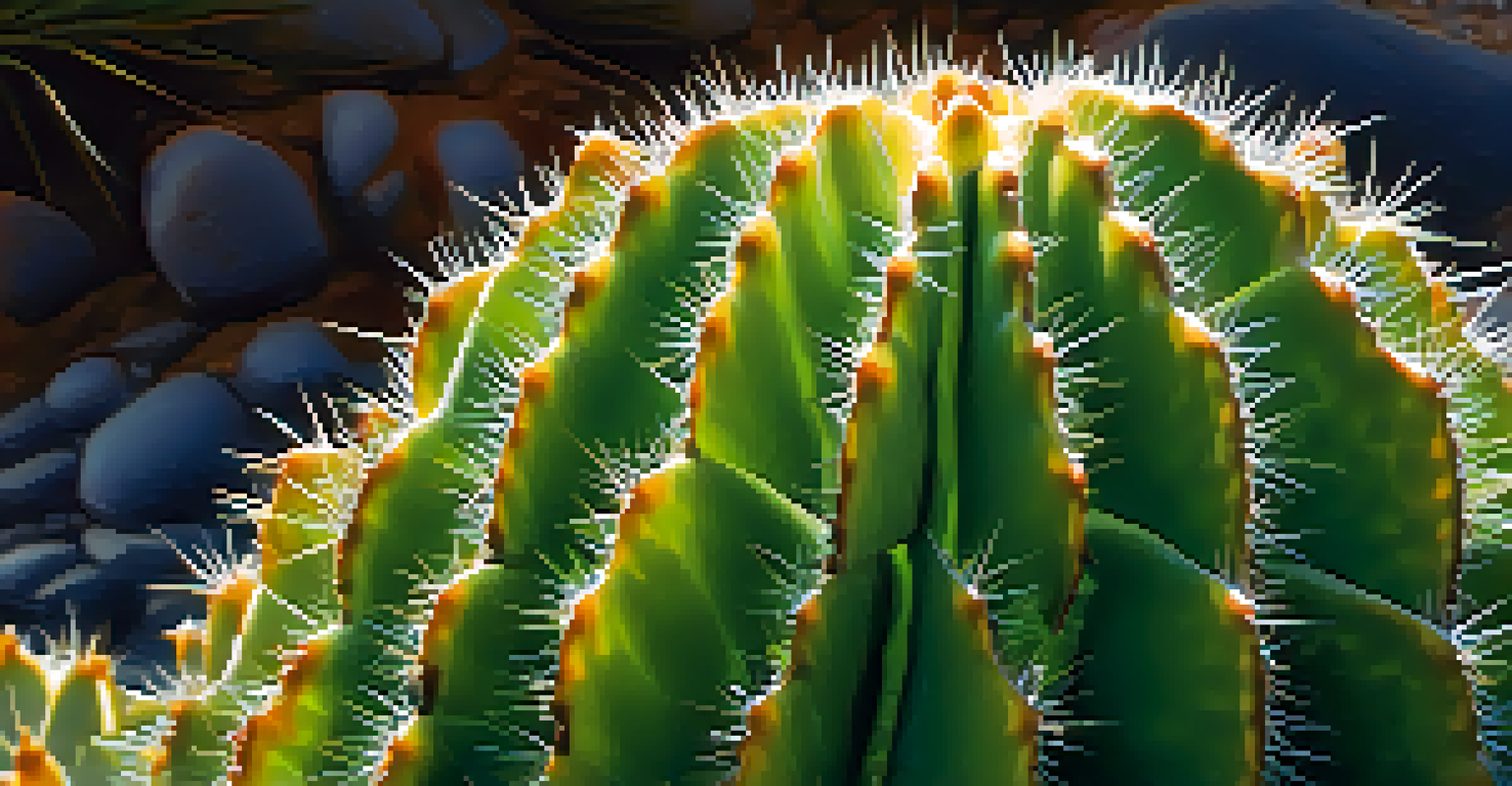Cultural Significance of Peyote in Mental Wellness

Understanding Peyote: A Brief Overview
Peyote is a small, spineless cactus known scientifically as Lophophora williamsii. It contains the psychoactive compound mescaline, which has been used for centuries in various indigenous cultures. Often associated with traditional ceremonies, Peyote holds a significant place in the spiritual and cultural practices of Native American tribes.
The use of Peyote is not merely recreational; it serves as a conduit for deeper introspection and connection to the spiritual realm.
The use of Peyote is not merely recreational; it serves as a conduit for deeper introspection and connection to the spiritual realm. Many tribes view it as a sacred medicine, integral to healing and community bonding. This historical context enriches our understanding of its potential benefits for mental wellness.
As interest in natural remedies for mental health grows, Peyote's role is being reevaluated. The cactus is becoming increasingly recognized not just for its cultural importance but also for its therapeutic potential, opening doors to conversations about its relevance in modern mental health treatment.
Peyote in Indigenous Healing Practices
For many indigenous tribes, Peyote is central to their healing rituals. Ceremonial use often involves guided experiences designed to foster emotional and psychological healing. Participants report profound insights and emotional releases during these ceremonies, highlighting the plant's therapeutic qualities.

These healing practices are deeply rooted in traditions that emphasize community support and connection to nature. The use of Peyote is typically guided by experienced shamans or healers, creating a safe space for exploration and healing. This structured approach contrasts sharply with more casual uses of psychedelics in contemporary settings.
Peyote's Cultural Significance
Peyote is viewed as a sacred medicine in indigenous cultures, integral to healing and community bonding.
The integration of Peyote into healing practices underscores its cultural significance. It is not just about the psychoactive effects; it is also about fostering a sense of belonging and purpose in one's life, contributing to mental wellness in a holistic way.
Scientific Research on Peyote and Mental Wellness
Recent scientific studies are beginning to explore the mental health benefits of Peyote. Research suggests that mescaline may offer therapeutic effects for conditions like depression, anxiety, and PTSD. These findings align with the anecdotal reports from those who have participated in traditional ceremonies.
Mental wellness is seen as a balance between the individual, their community, and the natural world.
One of the reasons for this renewed interest is the growing body of evidence supporting psychedelic therapy. Many researchers are looking at how substances like mescaline can promote neuroplasticity, which is the brain's ability to reorganize itself. This could pave the way for new treatment paradigms in mental healthcare.
While more research is needed to fully understand the implications, studies indicate that Peyote may play a role in mental wellness. This scientific validation of traditional practices could bridge the gap between ancient wisdom and modern therapeutic approaches.
Cultural Perspectives on Mental Health and Healing
Different cultures have unique views on mental health and healing, often intertwined with spirituality and community. For many indigenous peoples, mental wellness is seen as a balance between the individual, their community, and the natural world. This holistic perspective contrasts with Western approaches that often focus solely on individual treatment.
In this context, Peyote serves as a tool for deeper understanding and connection. It encourages participants to reflect on their place within their community and the universe. This broader lens can facilitate healing that is not just about alleviating symptoms but also about fostering a sense of purpose.
Therapeutic Potential of Peyote
Recent studies suggest that mescaline, the active compound in Peyote, may offer therapeutic benefits for mental health conditions like depression and PTSD.
Understanding these cultural perspectives enriches our appreciation for Peyote's role in mental wellness. It highlights the importance of respecting traditional practices while considering how they can inform contemporary mental health treatments.
Challenges and Controversies Surrounding Peyote Use
Despite its cultural significance, the use of Peyote is not without challenges. Legal restrictions often limit access for those wishing to participate in traditional ceremonies. Additionally, the growing popularity of Peyote in non-indigenous contexts raises concerns about cultural appropriation and the commodification of sacred practices.
These challenges necessitate a respectful dialogue about who gets to use Peyote and how. It's crucial to acknowledge the voices of indigenous communities in discussions about its therapeutic potential. Without their input, there's a risk of undermining the cultural significance that Peyote holds.
Navigating these complexities requires sensitivity and awareness. By engaging with indigenous leaders and respecting their traditions, we can foster a more inclusive conversation around Peyote's role in mental wellness.
Personal Experiences: Stories from Peyote Ceremonies
Many individuals who have participated in Peyote ceremonies share transformative experiences that profoundly impact their mental health. These personal stories often highlight feelings of interconnectedness, emotional healing, and newfound clarity. Such narratives serve as powerful testimonies to the cactus's potential benefits.
For instance, someone might describe how a Peyote ceremony helped them confront past traumas, allowing for emotional release and healing. These experiences are often described as life-changing, providing participants with insights that can lead to long-term mental wellness.
Challenges of Peyote Use Today
Legal restrictions and concerns over cultural appropriation raise important questions about the appropriate use of Peyote in modern contexts.
These anecdotes underscore the importance of community and support in the healing process. They remind us that mental wellness is often a journey best undertaken with others, guided by shared experiences and cultural traditions.
Looking Ahead: The Future of Peyote in Mental Health
As interest in alternative mental health treatments grows, the future of Peyote in therapy looks promising. Continued research may lead to a better understanding of its effects and applications in modern psychology. This could open doors for integrating traditional practices into contemporary mental health frameworks.
However, it is essential to approach this future with caution. Ensuring that indigenous voices are at the forefront of discussions will be crucial in preserving the cultural integrity of Peyote use. This means advocating for responsible practices and respecting the traditions that have honored Peyote for generations.

The journey of Peyote from sacred plant to potential therapeutic tool reflects broader trends in mental health. By honoring its cultural roots while exploring its modern applications, we can cultivate a more holistic approach to mental wellness.